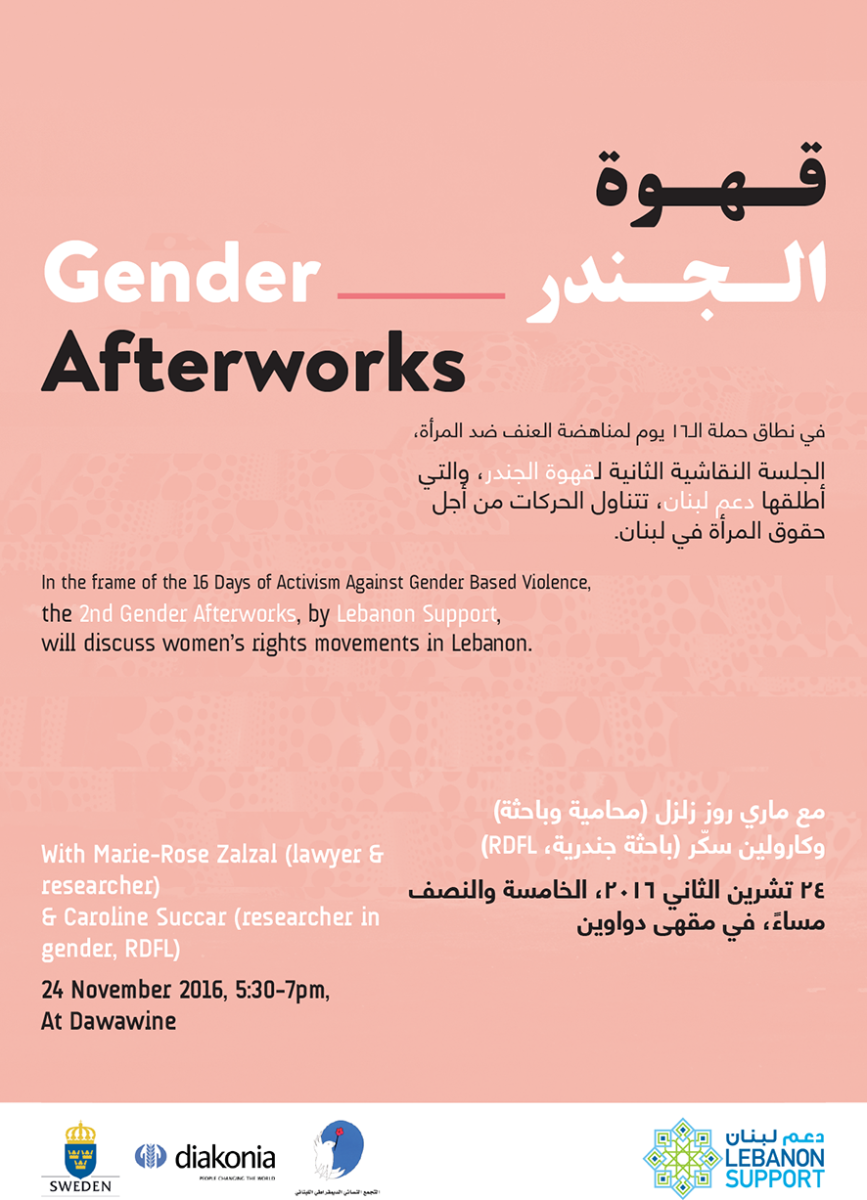Gender Afterworks: Women’s rights movements in Lebanon
On the 24th of November, Lebanon Support hosted its 2nd Gender Afterworks discussion focusing on women's rights movements in Lebanon. The event marked the beginning of the 2016 16 days of activism against gender-based violence. It was the second in a series within our Gender Equity Network, a thematic project part of our Civil Society Knowledge Centre, which aims to covers gaps in knowledge on this issue and make gender literature easily accessible. The discussants were Caroline Succar, from the Lebanese Women Democratic Gathering (RDFL) and a researcher in gender, and Marie-Rose Zalzal, a lawyer and researcher specialising in women’s rights.

The discussion analysed the achievements of women organisations in Lebanon since 1953, including the achievements of the right to inheritance in 1959, the right to nationality a year later, and the abolishment of legal punishment against the use of birth control in 1983. Discussants then also highlighted some of the greatest challenges still facing women today. Among these challenges, discussants mentioned the permanence of sexual exploitation, early child marriage, and marital rape, as well as the lack of a legal quota that would place women in positions of power, such as the cabinet and positions of economic importance.
Afterwards, Caroline Succar provided a history of feminist movements inside of Lebanon and how they have progressed, though the speaker made sure to differentiate between a feminine movement and a feminist movement. The latter is rights-based and advocates for the advancement of equality, while the former is only lead by women.
Here, Ms. Succar noted that in Lebanon, organisations are usually either service- or advocacy-based. Advocacy-based organisations, however, tend to be elitist in contrast with their constituencies and the public at large. This then led to the question of whether we truly have feminist organisations in Lebanon, or whether these organisations merely cater to their own private interests with some gender goals.
However, even so, if the overall social movement were to adopt feminist causes, gender equality in Lebanon would advance strategically through the will of many organisations. It is important to note here that one of the greatest hurdles of feminist movements however is the sectarian regime in Lebanon, which prevents steps to equality by allowing the confessional system to fill in for federal law on civil matters, as Me Marie-Thérèse Zalzal put it. As such, collaboration between women's organisations and authoritative figures, such as religious ones, often men, can be problematic and polarise feminist causes. Also brought up during the discussion was the importance of considering women’s and gender issues as political issues, and that such demands can and should be included in broader civil society action.
Notably, discussants also discussed how the duplication of work and competition for funding is among the main challenges leading to the fragmentation of the feminist movement and feminist action today. In turn, this hurts the feminist cause overall, and splinters feminist objectives [editor’s note: for more on this specific issue, read our report “Overview of Gender Actors & Interventions in Lebanon”].

